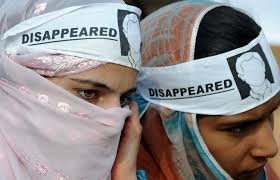Not only are the half widows being denied the share in property but religious scholars believe that this phenomenon is widespread in valley and the cases of such violations are coming to fore in large numbers.
Deprived of financial assistance from her in-laws, Tabasum (name changed) is bringing up her two children in a two-room accommodation in Srinagar all by herself after her husband disappeared in the year 2000.
“After last year’s floods, my in-laws asked me to vacate the home. I have no one to take care of my children,” Tabassum, who is a ‘half-widow’, told. Her expenses are presently being taken care of by Association of Parents of Disappeared Persons (APDP), collective of relatives of victims of enforced and involuntary disappearances in Kashmir formed in 1994.
Like Tabasum, there are numerous half-widows in Kashmir who have been left bereft of their husband’s property’s share after their spouse disappeared in the conflict-trodden valley, says APDP’s Chairperson Parveena Ahanger.
Majority of half-widows do not remarry, suggests research
“Problem with half widows, whose husbands have disappeared but have not been declared dead, is that majority of them don’t have a skill set that could provide them a good living. Besides, social stigmatisation, financial burdens takes a toll on their lives,” confides Sumera Majid, a research scholar at Kashmir University.
It is estimated that about 8,000 people have been subjected to enforced disappearances by security forces since the onset of the conflict in the valley, according to the APDP.
Sumera, who has done a research on half widows titled “Issues and Problems of Half Widows”, refers to several case studies which show that majority of half-widows do not opt to remarry.
Cases of violations of Islamic edict are coming to fore in large numbers
Despite an Islamic edict in place that half widow be considered a ‘widow’ after four years of husband’s disappearance thus giving her right to remarry and claim the property share from the husband’s property, the edict is not being followed in letter and spirit.
The edict was passed years ago, but according to Parveena of APDP, in-laws of half-widows continue to deny them a share of their husband’s property, while asking religious scholars to take strong notice of this alarming issue.
Not only are the half widows being denied the share in property but religious scholars believe that this phenomenon is widespread in valley and the cases of such violations are coming to fore in large numbers.
Prominent religious scholar Ghulam Rasool Hami told that the denial of property share to women in general is a grave situation which needs to be taken care. “Almost 80-90 percent of women are not given the rightful share in their parent’s, or husband’s property granted under Sharia law,” Hami says.
He adds that there is trick being played by people claiming that the expenses of marriage of a girl were done from her property share thus leaving her with no claim whatsoever. “People need to understand that this is a gross violation of Sharia law,” Hami stresses.
Tribunal to address half-widows’ rights should be set up
According to scholars who participated in the day long seminar held in Srinagar on Thursday, such half widows should approach a community comprising of Islamic scholars to get the issue settled. Scholars present at the seminar – Mujahid Shabir Ahmed Falahi from Jamat-e-Islami, Maulana Manzoor Ahmed from Karwan e Islami, Moulana Hakeem Sajjad Hussain from Ahlul Bait Foundation of the Shia minority group, and scholar and academic Hamid Nasim Rafiabadi – also suggested that “greed and ignorance are the main reasons behind the denial of the rights to girls.”
The Ulema said a joint tribunal should be set up to check the menace of not giving property rights to women, and half-widows in particular. “Land is rarely given to girls as share owing to the high price tag attached to it and only some cash payments or promises of future settlements are made. But seldom are these promises fulfilled,” Shia cleric Hakeem Sajad insists.





